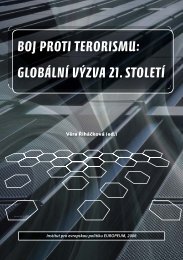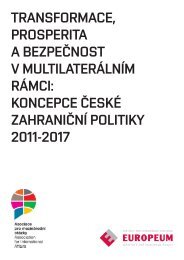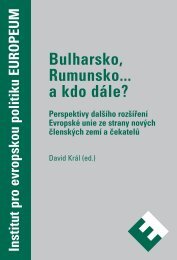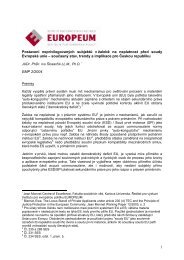eu constitutionalisation - EUROPEUM Institute for European Policy
eu constitutionalisation - EUROPEUM Institute for European Policy
eu constitutionalisation - EUROPEUM Institute for European Policy
You also want an ePaper? Increase the reach of your titles
YUMPU automatically turns print PDFs into web optimized ePapers that Google loves.
Chapter 7: Flexible Integration in the Common Foreign and Security <strong>Policy</strong>C. The procedure of joining enhanced cooperation at a later stageThe principle of opennessThe legally anchored principle of openness, providing <strong>for</strong> participation toenhanced cooperation either at the initial or at a later stage, unconditionallyapplies to all policy fields of the <strong>European</strong> Union.²⁹ In other words, opennesshas to be guaranteed at any phase of enhanced cooperation. However,the requirement to pass a specific process of application and authorisation,which is necessary due to a deliberate lack of automatic adherence, challengesthe principle of openness. Respective modalities on later accessionare enacted in Article 27e TEU.The procedure according to Article 27e TEUAccording to this article any interested member state wishing to participatein enhanced cooperation has to notify its intention to the Council. It shallalso in<strong>for</strong>m the Commission which is entitled to <strong>for</strong>mulate an opinion tothe Council within three month. As to the Council, it has to decide onthe request within four months of the date of receipt of that notification.Moreover the Council has the discretion, where necessary, to decide upon“specific arrangements” in cases where it may deem necessary. To put it moreconcretely, despite the principle of openness participation may not beconstituted by a unilateral declaration but requires a <strong>for</strong>mal procedure.The Council, in its totality, decides on the request of adherence by qualifiedmajority but approval is ideally expressed by concealment.³⁰ Any refusalof accession to enhanced cooperation has to be qualified as of temporarynature, since any permanent exclusion from an existing enhanced cooperationwould be in direct conflict with the Treaty.The option of “specific arrangements“In a further step the Council disposes of the right to decide on “specificarrangements” where necessary, <strong>for</strong> example, in order to facilitate the participationof interested member states. This construction may be compared29) The guarantee of participation is stated in Article 43b TEU together with Article 27e (second pillar), Article40b TEU (third pillar) and Article 11a TEC (first pillar).30) With regard to enhanced cooperation in the first pillar it is the Commission to decide upon any participationat a later stage (Article 11a TEC) and in the third pillar it is the Council in the composition of theCouncil members concerned (Article 40b TEU).254Chapter 7: Flexible Integration in the Common Foreign and Security <strong>Policy</strong>to the well-known transitional arrangements frequently used during theprocess of EU accession. In turn it is not explicitly excluded that specificarrangements of this sort are used in such a way to create more severe criteria,thus rendering participation more difficult. Although the objectives setout in the initial decision authorising enhanced cooperation must not bealtered or its implementation complicated, one may always define conditionswhich risk to undermine the general right of participation.The Procedure according to the Treaty establishing a Constitution <strong>for</strong> EuropeSimilarly to Nice, the constitutional treaty provides <strong>for</strong> accession at a laterstage, which is explicitly enshrined in Article III-420 para 2 TCE. Comparedto the current legal system, slight but important differences appear,although they do not contribute to accelerate the <strong>for</strong>mal procedure. Firstly,the obligation to notify the intention to participate in enhanced cooperationhas been extended beyond the traditional organs, namely the Counciland the Commission, to the Union Minister <strong>for</strong> Foreign Affairs. In turn, theCommission’s obligation to issue a stated opinion has been dropped (butthe Commission is free to <strong>for</strong>mulate one). With regard to the Council, onemay observe an increased number of restrictions compared to its <strong>for</strong>merposition. In the composition of the member states concerned it holds nodiscretionary decision making powers anymore, but has to <strong>for</strong>mally “confir m ” the participation of the interested member state, after consulting theUnion Minister <strong>for</strong> Foreign Affairs, and after “noting” that the pre-set conditionshave been successfully met. This means, that also later participationrequires full and explicit approval by the Council, leaving aside the possibilityto accept new members by pure concealment. Another innovationrefers to the option to introduce specific conditions <strong>for</strong> participation in therelevant <strong>European</strong> decision founding enhanced cooperation. Against thisbackground Emmanouilidis noticed a process of “challenging the principle ofopenness” within the framework of the Constitution.³¹ The author howeverdisagrees with this observation, pointing at the institutionalised optionof “specific arrangements” in the treaty of Nice, which already allows <strong>for</strong>far-reaching limitations to the principle. In turn, the obligation to definerelevant conditions already at the initial stage of enhanced cooperation andto incorporate them into the founding decision, significantly strengthenspredictability and renounces to the vague style and <strong>for</strong>mulation of the31) In the original German version Emmanoulidis speaks of „Konditionalisierung der Offenheit“; EMMANOULIDISin GIERING (2003) p. 68.255








